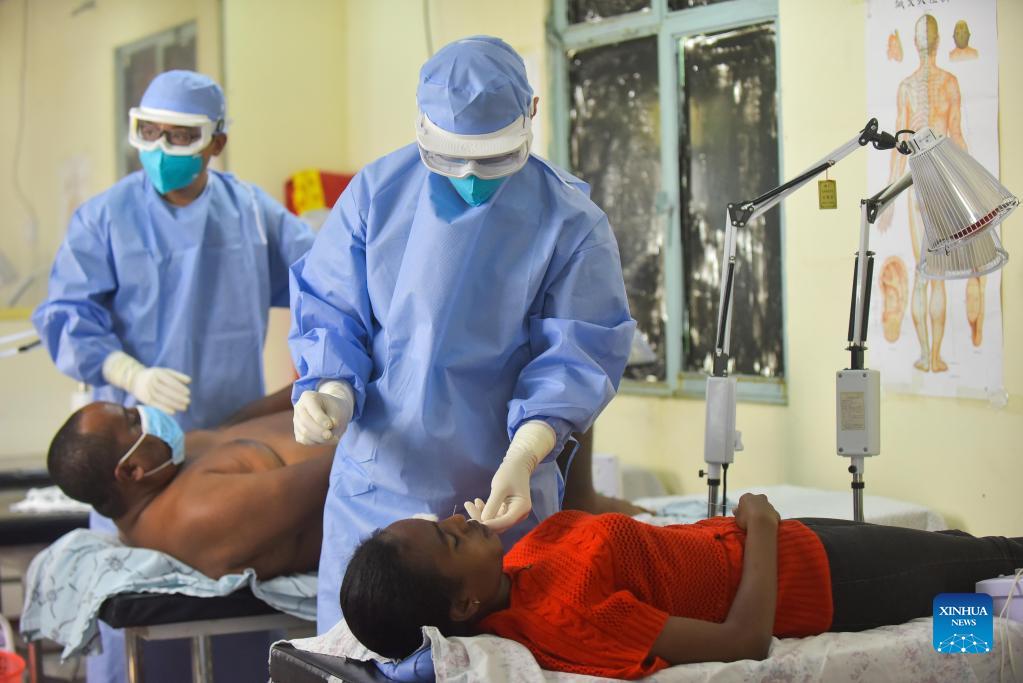
Doctors of the 22nd batch of the Chinese medical team to Ethiopia treat Ethiopian patients with acupuncture at Tirunesh Beijing Hospital on the outskirts of Addis Ababa, capital of Ethiopia, Aug. 27, 2021. (Photo by Michael Tewelde/Xinhua)
ADDIS ABABA, Sept. 30 (Xinhua) -- Metaferia Demissie, 48, recalls years of agony as a result of serious ailment that he suffered prior to regaining his well-being at the Chinese-built Tirunesh Beijing Hospital on the outskirts of the Ethiopian capital, Addis Ababa.
"My stomach and legs had swollen and was aching as I came to the hospital. But, I regained my health thanks to the nice treatment offered to me by Chinese physicians," Demissie told Xinhua recently, shortly after he was discharged from the hospital.
Demissie is one of about 20,000 Ethiopians who have received healthcare service by the 22nd batch of the Chinese medical team over the last nine months at the hospital, which is also known as Ethio-China Friendship Hospital that was built with the financial support of the Chinese government.
Living up to its promises, Chinese government has been sending medical teams to the hospital every year since 2012 as one the largest public health cooperation projects with the East African nation.
"The 22nd batch of the Chinese medical team consists of 16 medical professionals," said Liu Ruiqiang, leader of the medical team.
China's continued support to Ethiopia's public health sector has not been limited to sending medical teams. A variety of medical equipment has been sent to the African country over the years.
"We receive the much-needed medical equipment from each Chinese medical team," said Illibabur Boru, CEO of Tirunesh-Beijing Hospital.
Appreciating the valuable donations, Boru went on saying that the medical supplies donated by the Chinese medical teams are not something that could be found easily in the local market.
In April, the 22nd batch of the Chinese medical team donated emergency supplies, including ventilators, and protective and isolation clothing that could be used during surgical operations, said the team leader.
The team had also donated other medical equipment, including electronic fetal monitor, to the Department of Obstetrics and Gynecology, and cataract surgical instruments and relevant consumable materials to the department of ophthalmology in the following months, according to the leader.
"The Chinese colleagues have been assisting us in different ways notably in the delivery of health care services to new coming patients and outpatients besides performing surgical operations," said Sara Abebaw, an ophthalmologist at the hospital.
"The team has provided us high tech medical supplies including slit lamp, microscope, sterilization, ultrasound machines and protective clothes," said Abebaw after performing cataract operation along with an Chinese ophthalmologist.
"I am very happy to work in Ethiopia as an ophthalmologist," said Chinese ophthalmologist Liu Yanyan who assisted Abebaw during the cataract operation.
Yilkal Berhanu, head of the ophthalmology department, said with the support of the Chinese medical professionals, they are able to treat up to 50 patients per day.
Lemlem Tewoldemedhin, 65, was a patient who underwent cataract operation in the ophthalmology department of the hospital. "I am very grateful to the Chinese doctors who helped me regain my sight," Tewoldemedhin commented.
According to the CEO, the knowledge and skill transfer from the Chinese medical team is "immeasurable."
"Chinese and Ethiopian doctors work as a team and get along well in all departments," said Boru, who was the only neurosurgeon to the hospital before he was joined by a Chinese neurosurgeon who is a member of the Chinese medical team.
As a member of the 22nd batch of the Chinese medical team, professor He Yang serves as interpreter and has been making interactions between the Chinese and local doctors easy.
Apart from solving communication barriers, He Yang also offers Chinese language lessons to the local doctors who are eager to learn Chinese language and pursue further education in China.
The communication barrier has faded away after some of the local doctors started to attend Chinese language, said Mikiyas Legesse who works as a coordinator between Chinese medical professionals with Ethiopian counterparts.
The China-aided hospital has already established relationships with different hospitals in China's Henan province where Ethiopian doctors had been attending short term training and drawing experiences until the outbreak of COVID-19 pandemic, the CEO said.
The 22nd Chinese medical team under the captain of Liu Ruiqiang occasionally organizes lectures as part of an effort to fill the knowledge gap and share the Chinese medical technology and treatment. Enditem